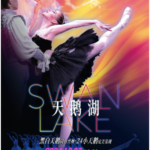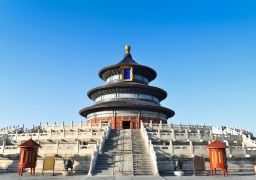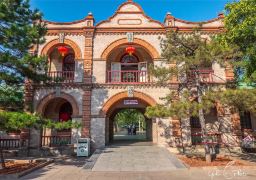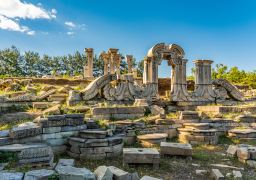On the eve of the peaceful liberation of Tibet, a serf mother named Lamu, who suffered persecution from the manor lord, died with resentment. Her blind daughter, Dolma, was sold, and her two sons, Gonbu and Sangjie, fled in different directions, never to meet again. Later, during the peaceful liberation and construction support of Tibet, the fate of these three Tibetan orphans was completely changed. Forty years later, Sangjie, now a teacher, is surrounded by students and in a trance, he seems to return to the bitter years of servitude; to the night of bloodshed after losing his family; to the warm back of a Han mother in the snowstorm… Thus, Sangjie slowly flips through the pages of memory.
From song to dance drama, creating a visual feast From 1963, when the song ‘Singing a Mountain Song to the Party’ composed by Zhu Jian’er was sung by the famous opera performer Ren Gui Zhen at the Learn from Lei Feng mobilization meeting, it caused a national sensation and quickly became one of the most widely sung songs. In the 70 years since, the song has been performed by generations of singers such as Jiang Yang Zhuoma, Cai Dan Zhuoma, Mao Amin, and Han Hong, making it a ‘timeless classic’. Seventy years later, the dance drama ‘Singing a Mountain Song to the Party’ meets the audience, completing the sublimation of this theme from auditory to visual, performing the story and emotions through dance, creating a visual feast. Many viewers are captivated by the exquisite acting of the Beijing Dance Academy’s teachers and students, ‘The live performance of this play is so exciting, the director team and actors are all too excellent!’ Adapted from a true story, a must-see memory of the era The ethnic dance drama ‘Singing a Mountain Song to the Party’ is adapted from a true story and was launched on the 70th anniversary of the peaceful liberation of Tibet. The work vividly re-creates the magnificent history of the Party leading the Tibetan people in democratic reform and prosperous development through several main chapters such as ‘Born as a Slave’, ‘Under the Sky Road’, and ‘Towards Happiness’. It awakens the memories of the older generation and creates a ‘Tibetan struggle and development history in the story’, looking at the glorious course of the Party leading national independence and revival through the story, a mark of the era and the people, helping modern people understand history and cherish modern life. Authentic Tibetan dance, widely praised on tour The ‘Singing a Mountain Song to the Party’ is performed by the Beijing Dance Academy Youth Troupe, co-created by teachers and students of the Folk Dance Department of Beijing Dance Academy. The authentic Tibetan ethnic dance has become the most eye-catching feature of the play. The director, Jin Miaomiao, once interpreted that ‘the play contains many signature dance sections with Tibetan style, and a large amount of life materials are used in the arrangement of the dance sections, condensing life details on the stage, making the entire work charming, story-rich, and观赏性.’In addition, the play also uses authentic Tibetan elements such as folk songs, musical instruments, highland barley, and hada. The play was staged as the opening play of the 15th ‘Flourishing Spring and Autumn – Stage Art Boutique Exhibition Week of Art Colleges and Universities’ at the National Centre for the Performing Arts in October 2022 and was widely praised. It also deeply moved audiences outside the field. Classmate Quan, a graduate student majoring in medicine, originally entered the theater with a try-it-out attitude but ‘I couldn’t help shedding tears several times during the performance.’ At the same time, the recent round of tour of this play has also received continuous praise. ‘Their superb acting skills and stage expressiveness are excellent!’
[Comments]
The expressions and emotions of the actors deeply touched me. As I expected, the emotional connection of the actors on the stage is not just as simple as the expressions on their faces. It is the connection of emotions in the hearts of the actors. This kind of power is very strong and can move the audience. – Professor Joy McNally, Department of Musical Theatre, Beijing Dance Academy
This performance made me feel that the actors are using their bodies to tell stories. This teaching method can not only improve their future acting and learning abilities but also inspire my future teaching at the Beijing Dance Academy. – Professor Vladimir Malakhov, Department of Ballet, Beijing Dance Academy
I was deeply moved by the Tibetan story described in the dance drama. In such a short time, such a grand scene and such a major event were presented. From being a serf to being liberated and then living a happy life, the entire performance process is very good. – Aunt Gao (actor of the art troupe)
This time I came with my child. During the performance, although he may not understand the profound meaning expressed by the dance segments, he would enthusiastically raise his hands above his head and applaud several times. I think the appeal of this ethnic dance drama is very strong. – Ms. Li (dance teacher)
What moved me the most was when the soldier in military uniform fell off the cliff to save the Tibetan people and when the People’s Liberation Army soldiers waved the red flag at the end. These two moments tightly tugged at my heart. – Mr. Tang (dance enthusiast)
I originally came with a try-it-out attitude, but I didn’t expect that I couldn’t help shedding tears several times during the performance. – Classmate Quan (graduate student majoring in medicine)
The dance movements in the dance drama are extremely infectious. When I sit here and watch, my emotions are carried away by the wonderful performances of the actors. Their superb acting skills and stage expressiveness are excellent! – Audience’s viewing experience sharing from Chengdu
Excellent, this dance drama.
The social conditions at that time were as presented in the dance drama, with a high degree of restoration. I hope more high-level dance dramas like this can come to perform here! — Viewing and performance sharing of audiences from Nanchong. Dance drama ‘Sing a Folk Song to the Party’. I think it is an extremely excellent performance. There is no dialogue in dance, but the emotions conveyed by the actors’ body movements have deeply shocked me. It’s so touching that I have been shedding silent tears. — Viewing and performance sharing of audiences from Deyang. It’s really so moving! The scene of this drama is so exciting. The director team and actors are all so excellent! I have been applauding until my hands are numb. As people from the Sichuan-Tibet area, I am deeply empathized tonight! — Viewing and performance sharing of audiences from Xichang. [Creator Information] ‘Sing a Folk Song to the Party’. Producer: Ba Tu, Xu Rui. General Planner: Zhang Liangxue, Zhang Qiang, Deng Youling, Dong Ping, Hui Tong, Su Ya. Chief Supervisors: Zhang Haijun. Artistic Consultants: Luo Dan, Sangga Zhuoma, Cairang Zhaxi. Chief Director: Jin Miaomiao. Screenwriter: Wang Yong. Composer: Kang Zhuqing. Visual Director: Ren Dongsheng. Stage Design/Prop Design: Jin Zhou. Lighting Design: Zhu Dan, Li Chao. Costume Design: Wu Lei. Styling Design: Sun Aina, Wang Yan. Choreographers: Yuan Jia, Wu Shuai, Zhang Tianyang, Gao Yan, Ma Qiong, Qiao Jingyu, Zhang Chi, Ouyang Jirui, Chen Zheng, Ouyang Dan. Text Coordinator: Qu Hongmei. Rehearsal Instructor: Sang Dan. Supervisors: Huang Sa. Producers: Yuan Jia, Zhang Hao. Project Management: Chen Yinan, Sun Qixuan. Performance Management: Wang Bo, Qi Chang. Production Management: Cai Jianghong, Chen Mengdi. Publicity Coordinator: Zhang Xidan, Li Yixuan, Xia Menghan. Performance Production Assistants: Wang Sixuan, Xu Xin. Still Photography: Wang Ning. Graphic Design: Hua Dongze. Cast List (The cast lineup is subject to the actual performance on the day): Tibetan mother: Wang Zan. Han mother: He Linqian. Brother Gongbu: Yao Liang, Lv Kedi. Sister Zhuoma: Guo Ge. Younger brother Sangjie: Pu Yu. Company commander: Liu Jing. Shepherd: Lv Kedi, Chen Shuolei. Slave owner: Zhu Wenyu. Shaman: Peng Yibo. Political commissar: Ma Xin. Housekeeper: Tang Nanpeng. Lead Dancers: Zhao Shan, Wang Zhiying, Sun Can, Jia Siyue, etc. Group Dancers: Grade 2021 of Chinese Ethnic and Folk Dance Department. The Beijing Performing Arts Service Platform is sponsored by the Beijing Municipal Bureau of Culture and Tourism. With supporting key repertoire performances, cultivating diverse performance spaces, and building an online performing arts service platform as the main contents, it strives to create a cultural business card of ‘Watching Grand Plays in Beijing’, continuously promotes cultural confidence and self-improvement, and gathers a powerful spiritual force to promote the development of the capital in the new era.









